If your Jeep smells like antifreeze, it could be due to a leak in the cooling system. This may be caused by a damaged radiator, a worn-out hose, or a faulty water pump.
A strong odor of antifreeze in your Jeep could indicate a potential coolant leak. This problem can be caused by a damaged radiator, worn-out hoses, or a faulty water pump. Identifying and fixing the source of the leak is crucial to prevent overheating and potential engine damage.
Ignoring the issue could lead to more serious and expensive problems down the road. It is important to address the smell of antifreeze in your Jeep as soon as possible to ensure the continued performance and reliability of your vehicle.

Credit: in.pinterest.com
What is Antifreeze?
Antifreeze plays a crucial role in maintaining the optimal performance of your Jeep. It is a liquid that is added to the engine cooling system to prevent freezing in cold temperatures and overheating in hot conditions.
Definition And Purpose
Antifreeze, also known as coolant, is a mixture of water and additives that helps regulate engine temperature. Its primary purpose is to absorb and dissipate heat, preventing the engine from overheating. Additionally, it lowers the freezing point of the coolant, allowing it to remain in a liquid state even in extremely cold weather conditions.
Common Ingredients
The main ingredient in most antifreeze solutions is ethylene glycol or propylene glycol, which act as the base fluid. These additives are responsible for preventing the coolant from freezing or boiling. To enhance its performance, antifreeze may also contain corrosion inhibitors, lubricants, and dyes.
The corrosion inhibitors protect the engine’s metal components from rust and other forms of corrosion caused by the coolant. Lubricants help reduce friction, minimizing wear and tear on the engine. Dyes are added to help identify any coolant leaks.
Typical Smell
Antifreeze generally has a sweet, almost syrup-like smell. The distinctive odor is caused by the ethylene glycol or propylene glycol base fluid. When your Jeep smells like antifreeze, it is an indication that there might be a coolant leak. The smell can be more noticeable inside the vehicle or near the engine compartment.
If you detect a strong antifreeze smell, it is essential to address the issue promptly. Driving with a coolant leak can lead to engine overheating, potential damage to engine components, and even engine failure.
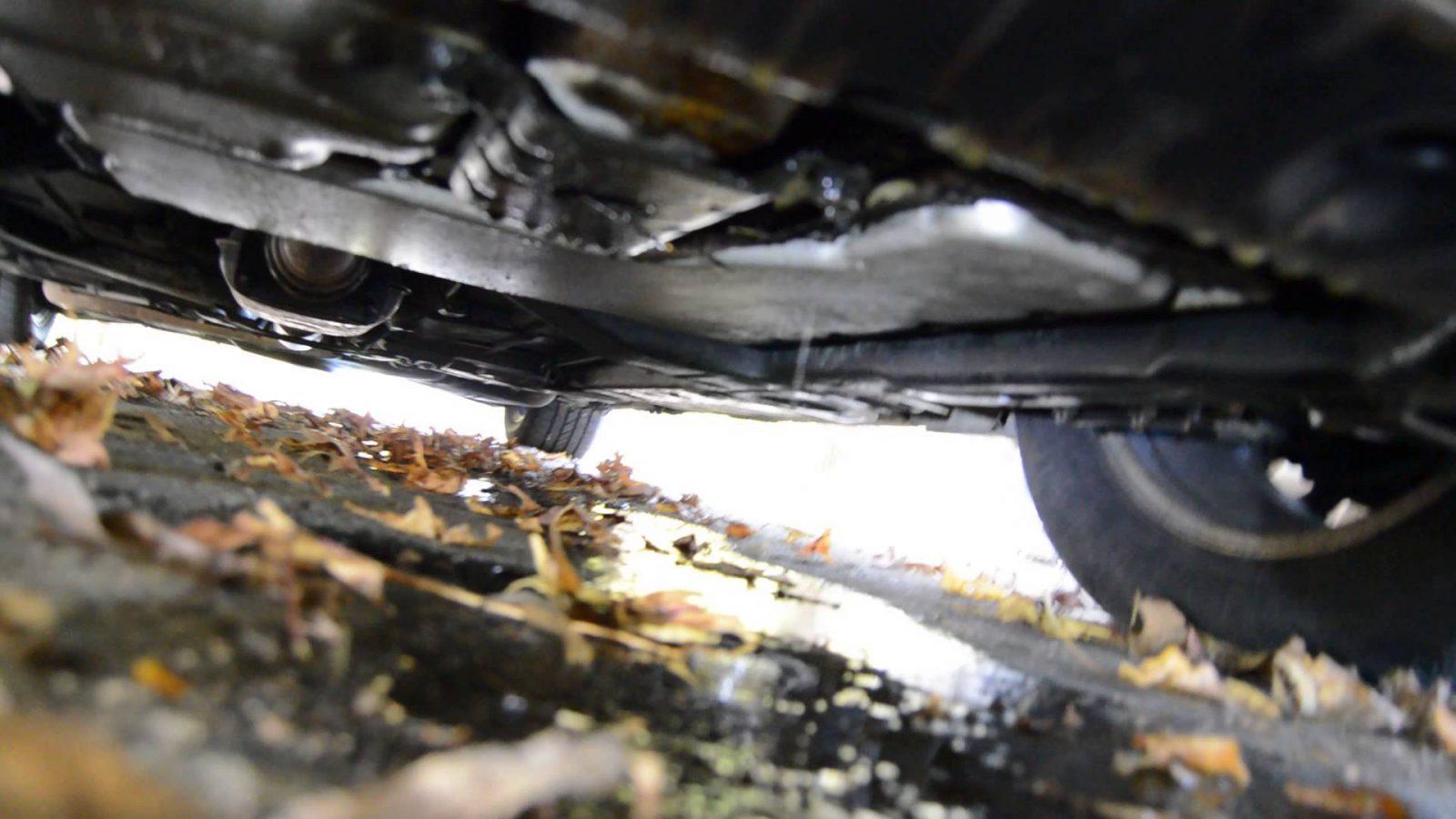
Credit: carfromjapan.com
Possible Causes Of Antifreeze Smell In A Jeep
i. Interior Smell
Experiencing an antifreeze smell inside your Jeep can be concerning. Not only is it unpleasant, but it may also indicate an underlying issue that needs to be addressed. In this article, we will explore some possible causes of the antifreeze smell in your Jeep’s interior.
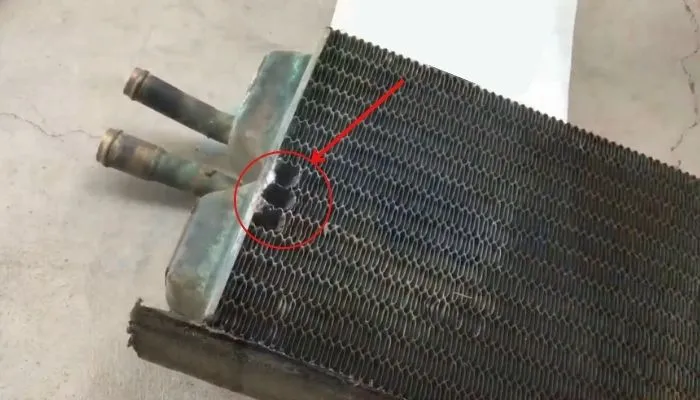
1. Heater Core Leak
A common cause of an antifreeze smell in the interior of your Jeep is a leak in the heater core. The heater core is a small radiator-like component located behind the dashboard that provides heat to the cabin. If there is a leak in the heater core, coolant can escape and create that distinct antifreeze odor.
2. Spilled Coolant
Another possibility is that coolant has been spilled inside your Jeep. This can happen during maintenance or repairs, or if the coolant reservoir or radiator cap is not properly secured. When coolant spills onto the carpet or upholstery, it can create a strong antifreeze smell that lingers.
3. Loose Coolant Hoses
One more potential cause of an antifreeze smell in your Jeep’s interior is loose coolant hoses. The coolant hoses in your Jeep connect various components of the cooling system, such as the radiator, water pump, and engine. If these hoses are not properly secured or have become worn over time, they may leak coolant and release the familiar antifreeze scent into the cabin.
Also Read: Why Does My Jeep Smell Like Burning Rubber
ii. Exterior Smell
When your Jeep starts emitting a strong odor of antifreeze, it can be concerning. There are various reasons why your Jeep might smell like antifreeze, and a common indicator of a potential problem lies in the exterior smell of your vehicle. Let’s explore the possible causes of the antifreeze smell in a Jeep when it’s originating from the exterior of the vehicle.
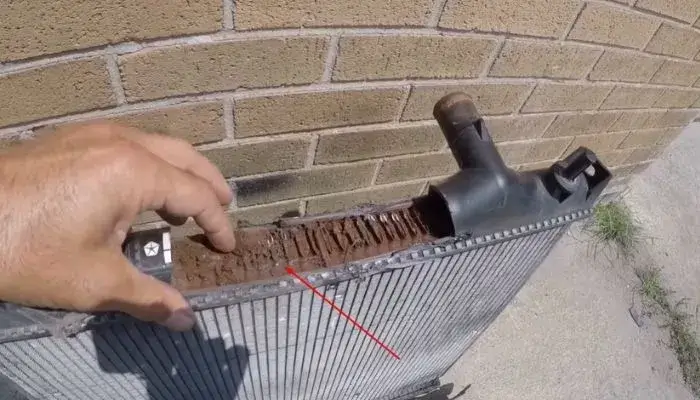
1. Radiator Leak
If you notice an antifreeze smell coming from your Jeep’s exterior, it may be indicative of a radiator leak. A damaged or corroded radiator can release the sweet-smelling liquid, leading to a distinct aroma. It’s important to address a radiator leak promptly, as prolonged exposure to the elements can exacerbate the issue.
2. Coolant Reservoir Issues
The presence of an antifreeze smell around your Jeep could also be attributed to issues within the coolant reservoir. Over time, the reservoir may develop cracks or other damages, allowing the pungent odor to escape. Regular maintenance and inspection of the coolant reservoir can aid in the early detection and resolution of such issues.
3. Hose Leaks
An overlooked cause of the antifreeze smell from a Jeep’s exterior can be attributed to hose leaks. The hoses responsible for circulating antifreeze throughout the vehicle can deteriorate, leading to leaks that emit the characteristic odor. Thoroughly inspecting and replacing worn hoses is imperative to mitigate this issue.
Also Read: Why Does My Jeep Smell Like Gas
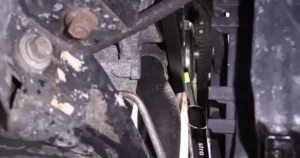
4. Water Pump Leak
If your Jeep is emanating the scent of antifreeze outdoors, it may hint at a potential water pump leak. This essential component can develop leaks over time, releasing the distinct smell of antifreeze. Identifying and addressing a water pump leak swiftly is crucial to prevent further damage to the vehicle.
5. Head Gasket Leak
An external antifreeze odor in your Jeep could also indicate a head gasket leak. This critical engine component, if compromised, can permit antifreeze to escape, leading to the noticeable smell. Timely diagnosis and repair of a head gasket leak can prevent extensive damage and costly repairs down the road.
Also Read: Fishy Jeep Smell: Causes and Solutions
Credit: wranglertjforum.com
Effects Of Antifreeze Smell
The smell of antifreeze in your Jeep can have various effects, from potential health risks to environmental impact. It’s important to understand these consequences to address the issue promptly. Let’s explore the Effects of Antifreeze Smell in detail.
1. Health Risks
The presence of antifreeze smell in your Jeep can pose serious health risks. Inhaling the fumes may lead to symptoms such as dizziness, headaches, and nausea. Exposure to antifreeze can be harmful if not addressed promptly and amply.
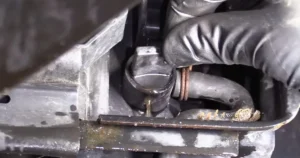
2. Potential Damage To The Engine
The smell of antifreeze in your Jeep could indicate a leak in the cooling system, which can lead to potential engine damage. If not addressed, this may result in overheating and costly repairs.
3. Environmental Impact
Leaking antifreeze from your Jeep can not only contaminate the ground, pose a potential hazard to wildlife, and pollute water sources. Promptly addressing any antifreeze leak is crucial to prevent environmental damage.
Also Read: Why Does My Jeep Smell Like Rotten Eggs
How To Diagnose The Issue
i. Visual Inspection
In this section, we will explore the first step in diagnosing the issue of why your Jeep smells like antifreeze – the visual inspection. By visually inspecting the engine bay and interior of your Jeep, you can gather valuable clues that will help you determine the source of the odor. Let’s dive into how to perform this visual inspection.
1. Engine Bay
Begin your visual inspection by focusing on the engine bay of your Jeep. Open the hood and take a look inside. Pay close attention to the following areas:
- Radiator: Check for any visible leaks or cracks in the radiator.
- Hoses: Inspect the hoses connecting the radiator and the engine for any signs of leakage or damage.
- Water Pump: Look for any leaks or stains around the water pump.
- Heater Core: Examine the heater core for any signs of leakage.
If you notice any wet spots, stains, or signs of coolant around these components, there is a high chance that the issue lies within the engine bay. Take note of these observations as they will help you further narrow down the source of the antifreeze smell.
2. Interior
After inspecting the engine bay, it’s time to move on to the interior of your Jeep. The smell of antifreeze can sometimes make its way inside the cabin. Here’s what you should check:
- Carpets and Floor Mats: Feel for any dampness or wetness in the carpets and floor mats, as this could indicate a coolant leak.
- Dashboard: Look for any signs of moisture or coolant stains on the dashboard.
- Under the Seats: Check underneath the seats for any visible coolant leaks.
If you can’t find any visible signs of coolant leaks in the interior, it’s still worth noting your observations. They may come in handy when analyzing other potential causes of the antifreeze smell.
Also Read: Why Does My Jeep Smell Like Burning Oil
ii. Coolant System Examination
If you are experiencing a strong antifreeze smell in your Jeep, it’s important to diagnose the issue promptly to prevent any further damage. One of the key areas to examine is the coolant system, which consists of several components that may be causing the smell.
By focusing on three main areas – the radiator, hoses, and heater core – you can identify the source of the antifreeze odor and address the problem effectively.
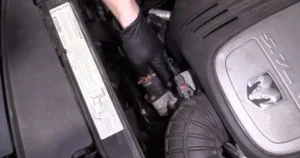
1. Radiator
The radiator plays a crucial role in the cooling of your Jeep’s engine. A leaking or damaged radiator can be a potential cause of the antifreeze smell. To examine the radiator:
- Inspect the radiator for any visible signs of leakage, such as coolant stains or wet spots.
- Carefully check the radiator cap for any cracks or damage.
- Ensure that the radiator fan is functioning properly and that no obstructions are obstructing the airflow.
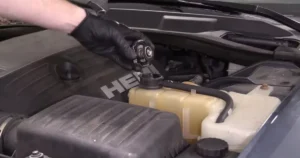
2. Hoses
Hoses in the coolant system transport the antifreeze to different components of your Jeep’s engine. Damaged or leaky hoses can be a common cause of the antifreeze smell. To examine the hoses:
- Closely inspect all hoses for any visible signs of cracks, tears, or leakage.
- Feel the hoses while the engine is running to check for any soft or swollen areas, as this could indicate a problem.
- Ensure that all hose clamps are tight and secure.
3. Heater Core
The heater core is responsible for providing heat for the interior of your Jeep. If there is a leak in the heater core, it can result in an antifreeze smell inside the vehicle. To examine the heater core:
- Check for any signs of leakage inside the vehicle, such as a wet carpet or a sweet smell.
- Inspect the heater core housing for any visible signs of coolant seepage or corrosion.
- If necessary, consult a professional mechanic for a thorough examination of the heater core.
Fixing The Antifreeze Smell
Repairing Leaks
If you have noticed a strange, sweet smell of antifreeze in your Jeep, it is important to address the issue as soon as possible. A strong antifreeze smell typically indicates a coolant leak, which can lead to engine overheating and severe damage if left untreated. In this section, we will discuss the steps you can take to fix the antifreeze smell by repairing leaks in your Jeep.
1. Replacing Damaged Components
One common cause of antifreeze smell in a Jeep is a leak in the cooling system’s components. To fix this issue, you will need to identify the damaged component and replace it. Here are some steps you can follow:
- Inspect the cooling system parts, including the radiator, hoses, water pump, and thermostat housing, for any signs of damage such as cracks, corrosion, or loose connections.
- If you find a damaged component, purchase a replacement part from a reputable auto parts store or directly from the manufacturer.
- Drain the coolant from the system to prevent any spills or leaks during the repair process. Refer to your Jeep’s owner’s manual for the proper procedure.
- Remove the old, damaged component carefully, taking note of the specific steps and precautions outlined in your Jeep’s repair manual or online resources.
- Install the new component following the manufacturer’s instructions and using the appropriate tools. Make sure all connections are tight and secure.
- Refill the cooling system with the correct type and amount of coolant specified by your Jeep’s manufacturer.
- Start the engine and check for any leaks. If no leaks are detected, allow the engine to reach operating temperature and ensure that the antifreeze smell has disappeared.
2. Patching Holes
Another potential cause of antifreeze smell is the presence of holes in the cooling system, which can lead to leaks. Here’s how you can patch these holes to eliminate the smell:
- Identify the location of the hole or holes in the cooling system. Common areas prone to developing holes include the radiator, hoses, and heater core.
- Prepare the surface of the damaged area by removing any dirt, debris, or rust that may interfere with the patching process.
- Apply a suitable coolant leak repair product, such as a sealant or epoxy, following the manufacturer’s instructions.
- Allow the patch to cure according to the recommended time specified by the product manufacturer.
- Inspect the patched area for any signs of leakage. If the leak persists, you may need to repeat the patching process or consider replacing the damaged component.
Preventive Measures
Prevention is always better than cure, and this principle holds true when it comes to dealing with the smell of antifreeze in your Jeep. By taking a few simple precautions and following some preventive measures, you can minimize the risk of encountering this unpleasant odor. Here are some key ways to keep your Jeep smelling fresh and antifreeze-free:
1. Regular Coolant System Checks
Ensuring your coolant system is in good working order is essential to prevent any leaks or odors. Make it a habit to regularly inspect the coolant reservoir and radiator for any signs of leaks or damage. In addition, check the hoses, clamps, and water pump for any potential issues that may lead to antifreeze leakage.
2. Use Of Quality Antifreeze
Using high-quality antifreeze that is recommended for your specific Jeep model is paramount. Cheap or low-quality antifreeze can lead to chemical reactions, causing a strong smell in your vehicle. Always follow the manufacturer’s guidelines and ensure proper mixture ratios for your antifreeze.
3. Scheduled Maintenance
Regular maintenance plays a vital role in preventing antifreeze smells. Follow the recommended maintenance schedule for your Jeep, which includes periodic flushing and refilling of the coolant system. This helps remove any old or contaminated coolant, reducing the risk of odors.
4. Proper Driving Habits
Your driving habits can also have an impact on the smell of antifreeze in your Jeep. Avoid rapid acceleration, harsh braking, and excessive idling, as these actions can put unnecessary strain on the coolant system. Additionally, try to avoid towing heavy loads or driving under severe conditions for prolonged periods, as it can increase the likelihood of coolant leaks.
5. Prompt Addressing Of Any Issues
If you do notice a smell of antifreeze in your Jeep, it is crucial to promptly address the issue. Ignoring the problem can lead to more significant damage and costly repairs. Take your vehicle to a trusted mechanic who can diagnose and fix any coolant leaks or system malfunctions.
Difference Between Engine Coolant and Antifreeze
Engine coolant, often referred to as “antifreeze coolant,” is a mixture of water and antifreeze. Its primary purpose is to regulate the engine’s temperature by dissipating excess heat generated during combustion. This ensures the engine operates within the optimal temperature range, promoting efficiency and longevity.
Antifreeze, on the other hand, is a chemical additive that is mixed with engine coolant. Its primary function is to lower the freezing point of the coolant, preventing it from solidifying in cold temperatures. Additionally, antifreeze raises the boiling point of the coolant, reducing the risk of overheating in hot conditions.
Jeep Smells Like Coolant But No Leak
If your Jeep smells like coolant but you can’t find a leak, here’s what you need to know:
| Possible Reasons | Troubleshooting | Solutions |
| – Residual coolant from past maintenance. – Heater core issues. – Blown head gasket. – Normal coolant evaporation. |
– Check for visible leaks. – Monitor engine temperature. – Inspect the heater core. – Consider a compression test for the head gasket. |
– Clean up any coolant residue. – Replace the heater core if necessary. – Address a blown head gasket promptly. – Maintain proper coolant levels and check for leaks. |
Jeep Wrangler Smells Hot But Not Overheating
If your Jeep Wrangler smells hot but isn’t overheating, there are a few possible causes.
The most common cause is a leaking coolant hose. Coolant hoses can develop leaks over time, and when they do, coolant can leak onto the engine or exhaust components, causing them to smell hot.
Another possible cause is an oil leak. If your Jeep leaks oil, it can also drip onto hot engine or exhaust components and cause a burning smell.
Finally, if your Jeep has been running hard and you haven’t had a chance to let it cool down properly, the engine may just be too hot — this is especially true if you’ve been driving in stop-and-go traffic or up steep hills.
If this is the case, the best thing to do is turn off the engine and let it cool down before continuing.
Wrapping Up
To wrap up, if you’re asking yourself why your Jeep smells like antifreeze, it could indicate a potential issue with your engine or cooling system. It is crucial to address this problem promptly to avoid further damage and expensive repairs.
Reach out to a mechanic for a thorough inspection and diagnosis. Don’t overlook the signs and ensure the longevity of your vehicle’s performance. Trust the experts and keep your Jeep running smoothly for years to come!
FAQs
Why Does My Jeep Smell Like Antifreeze?
If your Jeep smells like antifreeze, it could be a sign of a coolant leakage. Leaking coolant can be caused by a damaged radiator, a faulty water pump, a blown head gasket, or a cracked engine block. It is important to fix the issue promptly to avoid overheating and engine damage.
How Can I Identify A Coolant Leak In My Jeep?
To identify a coolant leak in your Jeep, check for signs such as low coolant levels, overheating engine, white smoke from the exhaust, or a sweet smell coming from the engine compartment. You can also inspect for visible coolant leaks by looking for wet spots or puddles under the vehicle.
If you suspect a coolant leak, it is best to have it inspected by a professional mechanic.
Can I continue driving if I smell coolant in my Jeep?
It’s best to avoid driving your Jeep if you notice a strong coolant smell, as it could lead to overheating or engine damage. Have it inspected by a mechanic.
Can A Coolant Leak In My Jeep Cause Engine Damage?
Yes, a coolant leak in your Jeep can lead to engine damage if not addressed promptly. Coolant plays a crucial role in keeping the engine cool and preventing it from overheating. If the coolant level is low due to a leak, the engine may overheat and cause serious damage, such as a blown head gasket or a warped engine block.
It is important to fix any coolant leaks as soon as possible to prevent costly repairs.

